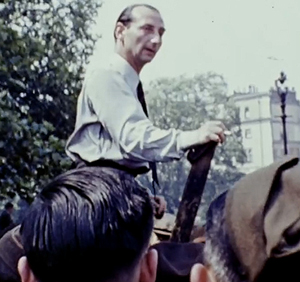
Lazy but rewarding 1950s afternoons at Speaker's Corner sail back to mind... our two favourite talkers were unusual improvising comics, brilliant at extracting the utmost of absurdity from mere body movements in any situation, their humour and repartee would fall flat in naked print, for it often hung on the situation. It was all entirely uncensored and gave a glimpse into the yeoman genius of English mental buffoonery. It was free entertainment at the expense of all and sundry, with no bad sportmanship if you found yourself to be the butt at the sharp end of the joke. Only certain antagonistic foreigners were occasionally liable to get heated or righteous.
I forget the name of our favourite man, but his aquiline, dark-browed hawkish look and seven o'clock shadow appearance always made me think of him as possibly being the father of the jazz musician Ronnie Scott. He had a yet larger catalogue of jokes he would draw upon, but it was the suave manner of a somewhat tired politician trying to educate a backward class and his inspired impromptu fill-ins to fit the circumstance (not on tenor sax but in a ringing tenor voice) that marked him out. It seems he was active already in 1944, since he appears in a US war documentary which shows wartime London and Speaker's Corner with this man and others. He was a good deal older when I knew him:-

From his sturdy soapbox, the same one every Sunday, this self-appointed dispenser of gratis fun would hold forth for anything up to a couple of hours or more, punctuated by 'tea-breaks', which he magnanimously allowed his listeners. No sooner did he rise on the one step than a band of regulars would drift around him, including Roger and I. We hung around all afternoon waiting for the time to come around to perform at the club. Our favourite comic began with a general sermon propagating his own views on all matters of contemporary or other concern, introducing himself as a free-thinking intellectual of no denomination without attachment to any party, creed, school of literary criticism or other known doctrine, unless it were that of 'laughter is happiness'.
He saved his greatest sarcasms for people who took themselves seriously, especially those who took politics too seriously, including politicians (would you believe it?). But his comments were mainly apolitical, absurd puns at the expense of anything absurd: minor current events or personalities then in the news, perceptive dethroning of by-now long-forgotten policies by bringing things right down to brass tacks... usually to show the crafty ways in which the rich and powerful get more of the same. The witty monologue would progress from theme to theme, with unexpected asides thrown in, such as on advertising, "On the side of the bus it says, 'Bachelor's Peas Are Better' See the cowardice in that?"
The inevitable hecklers were more of a nuisance than amusing. Some were regulars who went around with the same inane jokes and loudly interrupted all speakers simply to draw attention to themselves. One sorry specimen constantly kept spoiling our fun by asking over and over again, "Can a man with false teeth speak the truth?" Our man on the box tried to ignore him, then to silence him with heavy sarcasms which had no effect on the fellow. So he threatened several times to come down and punch him one. The heckler persisted, shouting out the same 'joke' over and over again. At last our hero descended regally, went over to the little pest and gave him a hefty wallop on the chest. The victim was utterly surprised and went off howling like a whelp. There was no laughter, only a tense air in the crowd... the speaker was the bigger man and he had dealt the little fellow a proper blow, which - though very well-deserved - made us feel a possible injustice had been done.
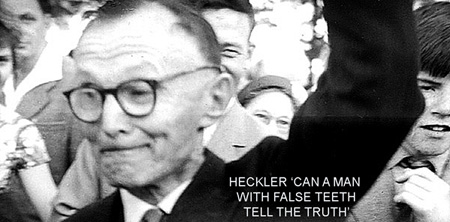
Unfazed by the episode, our speaker rose on his podium majestically, flexed his muscles, and announced, "I hit him with all my strength!" This elicited only silence. Then he added, "and if he'd been smaller, I'd have hit him even harder!" That won over the crowd completely.
One afternoon a short and serious black-beret Frenchman with a black goatee was craning to try to hear - or perhaps vainly to understand - what this mock-serious talker was saying. Now and again he asked for a repeat of words he hadn't caught. He was a short and perky fellow, type-cast for the role of some anarchistic or radical political of the well-know French brand. He soon began to gesticulate and complain that the speaker was not being serious, was just making fun of things... a social crime when the world was in such a terrible state, people suffering everywhere and so on and so forth.
After a polite answer from our speaker outlining his philosophy of happiness and humour, the haranguer grew very heated indeed and started a very one-way, tempestuous Gallic argument, interrupting proceedings to the irritation of many of us. "Talk about what matters to people... like the atomic bomb, American anti-communism... not some idiotic fooling!"
"Sir, while you are suffering vicariously to visible effect, I am trying to make this corner of the world a somewhat brighter place," our humorist at last deigned to answer him directly.
"I say 'rubbish'!" the irate little man shouted.
"You say rubbish? Well, I do not beg to differ with you."
Our man suggested he join another more political crowd, but the Gaul would have none of it... politics should prevail! But in no way could this tiresome interloper best our man. With rapier wit he destroyed every sentence the Frenchman uttered, discovering the most unlikely Freudian slips in his talk and capitalising on the inclarity of his heavily-accented English. The interrupter got by far the worst of it, but on he went, until at last our man offered an entente cordiale, saying 'let's be friends, let's just forget our differences and talk amicably together'. The Frenchman agreed, provided that the speaker would at least be serious.
"O.K. then, liberty, equality, fraternity ... so we are friends? Let us shake hands?"
"Yes, yes. We are all 'uman beings." The Frenchman leaned forward and shook.
"So now we really are friends? " Our man asked again.
Pacified, the Gaul insisted he was a true friend. Our speaker leaned forward confidentially and said in a voice that we could all just hear, "Since we are friends now, do you think you could possibly lend me five pounds?"
The radical agitator, truly galled and mauled, left the scene and our man announced 'Question time' as usual, stating his general willingness to answer any serious questions on any subject whatever - if asked in the correct time and place, namely 'Question Time', which was prior to the thereafter forthcoming tea-break. I had previously heard him reply to and Irish questioner on the meaning of James Joyce's Finnigan's Wake by giving a satirical resumé of this impenetrable tome's private language.
One afternoon, a scientific-looking type, an American, at the rear asked him, "Could you please give us an exposition of Einstein's theory of relativity?"
Our man immediately replied, "Do you want the general theory or the special?"
The interlocutor wanted the special. Our man stated that, since it was to be a brief exposition, he would be very succinct. "In its practical essence," he said, "Einstein's theory implies that, if you stood here looking through a telescope of infinite magnifying power, that due to the curvature of space, you would - after a seemingly infinite passage of time - eventually see nothing less than the back of your own neck".
As the biographer of Einstein, Ronald W. Clarke, wrote: "For in the "Einstein world", as it soon became known, the curvature produced by matter turned space back on itself so that a ray of light, moving in a straight line in terrestrial terms, would return to its starting point after circling the universe."
The interlocutor, when asked whether the explanation was adequate, pronounced himself completely satisfied with it, but he declined comment on our man's question as to whether he was perhaps an escaped nuclear physicist.
"What do you do?" someone asked him, probably meaning something like 'what is your day job?'.
"What do I do?" our man retorted in an incredulous tone. "Look, if I went up the Edgware Road and asked a navvy digging a bloody great hole, 'What do you do?' (He imitated the questioner's pitch and accent perfectly), "well, he'd reckon I was off my chomp, wouldn't he?" The crowd laughed. "What I do is what I am doing... I'm talking here at Hyde Park Corner, aren't I?"
Did I say gratis fun? Well, he would warn us in advance that he was shortly going to descend from his podium and mingle with us so that, seeing that collecting money there was illegal, we might force some tea-money on him from behind, "In that direct way, you also avoid the middleman's profit."
So popular this fellow was that there were a few who virtually had to force larger sums of money on him than he was at first willing to accept! This may have been due to generous natures or it may have been the tail-end of Britain's wartime spirit of sharing and not counting costs. Alas for progress... for since then middleman's profit has become the mainstay of England's economy and the money culture will soon have covered everything conceivable and have affected all day-to-day relationships throughout the world.
Another performer my friend Roger and I looked for every Sunday afternoon we were present was called Norman. He stood on a smallish soapbox and lectured the crowd in the lengthiest English sentences I have ever encountered... sometimes five or more minutes long. Soon a considerable crowd would gather and crane forward to try to catch the jist of it. The clauses and sub-clauses became so confusing that one soon lost the thread of his discourse which went into many tortuous asides and digressions supported by various motions illustrative of certain key words such as 'basically speaking' 'baisically speaking' 'bicycally speaking' and so on... eventually someone dared to ask him 'Could you explain in summary what you are saying?' Norman replied 'Don't ask me, I haven't a clue'. The crowd laughed. "But all these engaged citizens around us seem to understand it."
One day he was heckled relentlessly by an awful little Cockney woman who just kept loudly repeating her single comedy line, borrowed from another brainless heckling character... yes, you've got it: 'Can a man with false teeth speak the truth?'. Norman was totally unfazed by her continuously self-raising rant which went on most annoyingly through about 15 minutes of his winding labyrinth of words and motions. At last, he announced that he was about to take a tea break so as to give those present the opportunity to split up into smallish groups and discuss what they had just heard. "My friends, I wish to say I have the greatest sympathy for those of you who find yourself in the same group as this creature here" whereupon he looked directly at her for the very first time.
Norman's act was a very unpredictable and fresh every week, so he was clearly a cut above the average intellect due to his versatile mind and language. One fellow who had spoken to him in his breaks said he was actually a nuclear physicist who worked at Harwell and came to Speaker's Corner for his leisure and amusement. The people who came regularly to hear him were a lively bunch and kept up exchanges in the spirit of the preceptor during the dry tea breaks that had to be endured. This could have been true. However, many years later I found a photo of him on Google Images which was evidently from the 1970s, so he had held on for a long time, and apparently introduced a more clownish appeal:-
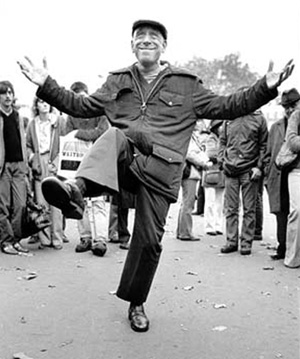
Some photos taken then show some of the habitués at the feet of Norman, the tatooed man on his soapbox, the ikonic ever-present 'The End is at Hand' banner man and more:-
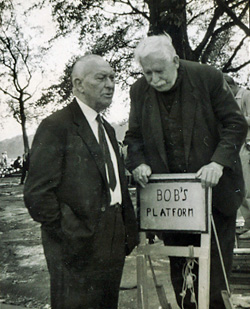
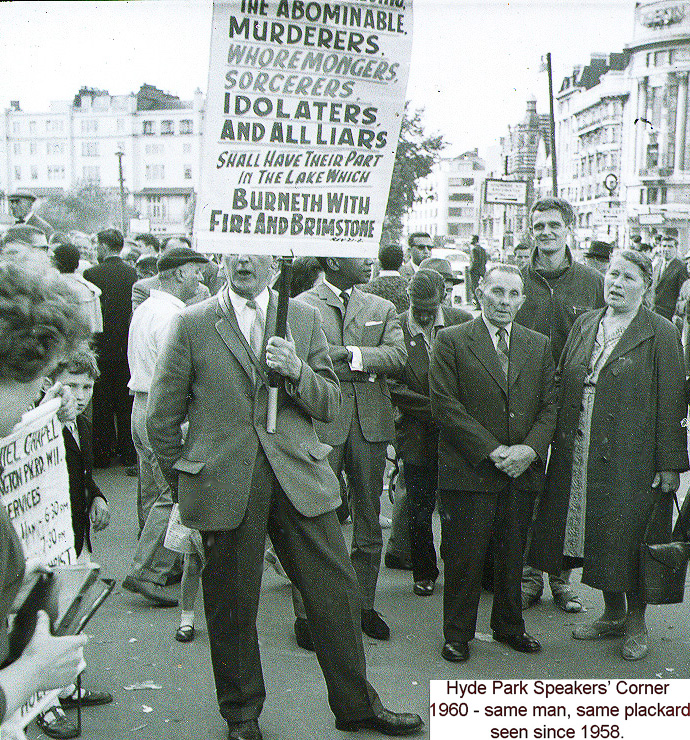
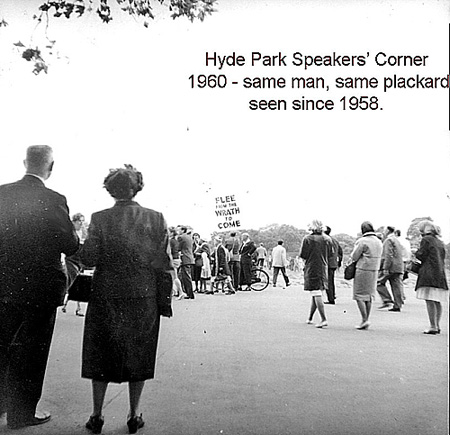
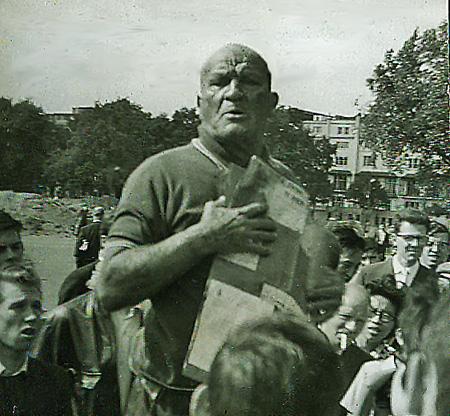
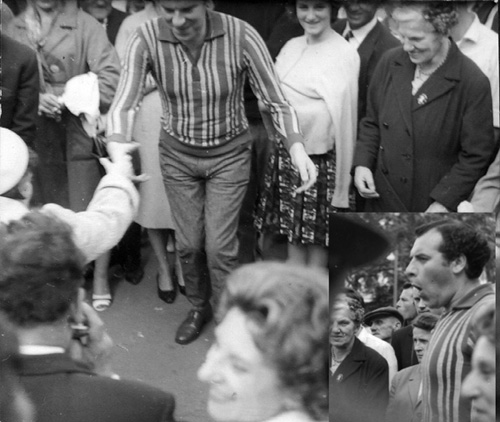
This was the very first time I came across real 'camp'. The jiving chap in the striped shirt was a worthy forerunner of Kenneth Williams